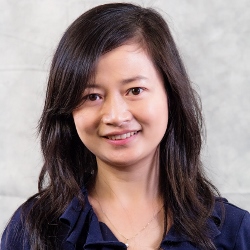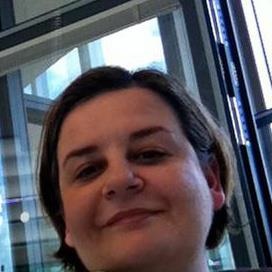KEYNOTE SPEAKERS
 Alexander Waibel is Professor of Computer Science at Carnegie Mellon University (USA) and at the Karlsruhe Institute of Technology (Germany). He is director of the International Center for Advanced Communication Technologies. Waibel is known for his work on AI, Machine Learning, Multimodal Interfaces and Speech Translation Systems. He proposed early Neural Network based Speech and Language systems, including the TDNN, the first shift-invariant “Convolutional” Network. Combining advances in ML with work on better multimodal interfaces, Waibel and his team developed pioneering solutions to cross-lingual communication, including some of the first consecutive & simultaneous translation systems, mobile speech translator, multimodal smart rooms and human robot collaboration. He published extensively in the field, received many awards and founded more than 10 companies in an effort to transfer academic results to practical deployment.
Alexander Waibel is Professor of Computer Science at Carnegie Mellon University (USA) and at the Karlsruhe Institute of Technology (Germany). He is director of the International Center for Advanced Communication Technologies. Waibel is known for his work on AI, Machine Learning, Multimodal Interfaces and Speech Translation Systems. He proposed early Neural Network based Speech and Language systems, including the TDNN, the first shift-invariant “Convolutional” Network. Combining advances in ML with work on better multimodal interfaces, Waibel and his team developed pioneering solutions to cross-lingual communication, including some of the first consecutive & simultaneous translation systems, mobile speech translator, multimodal smart rooms and human robot collaboration. He published extensively in the field, received many awards and founded more than 10 companies in an effort to transfer academic results to practical deployment.
Waibel is a member of the National Academy of Sciences of Germany and a Fellow of the IEEE. He received his BS, MS and PhD degrees from MIT and CMU, respectively.
 Harald Baayen Harald Baayen studied general linguistics with Geert Booij in Amsterdam, and obtained his PhD degree in 1989 with a quantitative study on morphological productivity. From 1990 to 1998 he was a researcher at the Max Planck Institute for Psycholinguistics in Nijmegen, The Netherlands. In 1998, upon receiving a career advancement award from the Dutch Science Foundation, he became associate professor at the Radboud University in Nijmegen, thanks to a Muller chair supported by the Dutch Academy of Sciences. In 2007 he took up a full professorship at the University of Alberta, Edmonton, Canada. In 2011 he received an Alexander von Humboldt research award from Germany, which brought him to the University of Tübingen. An ERC advanced grant is supporting his current research programme on discriminative learning. Harald Baayen has published widely in international journals, including Psychological Review, Language, Journal of Memory and Language, Cognition, Complexity, Behavior Research Methods, PLoS ONE, Journal of Experimental Psychology, Journal of Phonetics, and the Journal of the Acoustical Society of America. He published a monograph on word frequency distributions with Kluwer, and an introductory textbook on statistical analysis (with R) for the language sciences with Cambridge University Press.
Harald Baayen Harald Baayen studied general linguistics with Geert Booij in Amsterdam, and obtained his PhD degree in 1989 with a quantitative study on morphological productivity. From 1990 to 1998 he was a researcher at the Max Planck Institute for Psycholinguistics in Nijmegen, The Netherlands. In 1998, upon receiving a career advancement award from the Dutch Science Foundation, he became associate professor at the Radboud University in Nijmegen, thanks to a Muller chair supported by the Dutch Academy of Sciences. In 2007 he took up a full professorship at the University of Alberta, Edmonton, Canada. In 2011 he received an Alexander von Humboldt research award from Germany, which brought him to the University of Tübingen. An ERC advanced grant is supporting his current research programme on discriminative learning. Harald Baayen has published widely in international journals, including Psychological Review, Language, Journal of Memory and Language, Cognition, Complexity, Behavior Research Methods, PLoS ONE, Journal of Experimental Psychology, Journal of Phonetics, and the Journal of the Acoustical Society of America. He published a monograph on word frequency distributions with Kluwer, and an introductory textbook on statistical analysis (with R) for the language sciences with Cambridge University Press.
 Yunyao Li is a Principal Research Staff Member and Senior Research Manager at IBM Almaden Research Center where she manages the Scalable Knowledge Intelligence department. She is a member of the inaugural New Voices program of the American National Academies. She is also a Master Inventor and a member of IBM Academy of Technology. Her expertise is in the interdisciplinary areas of natural language processing, databases, human-computer interaction, and information retrieval. She is a founding member of SystemT, a state-of-the-art NLP system currently powering 20+ IBM products, and numerous research projects. She received her PhD and master degrees from the University of Michigan, Ann Arbor and undergraduate degrees from Tsinghua University, Beijing, China.
Yunyao Li is a Principal Research Staff Member and Senior Research Manager at IBM Almaden Research Center where she manages the Scalable Knowledge Intelligence department. She is a member of the inaugural New Voices program of the American National Academies. She is also a Master Inventor and a member of IBM Academy of Technology. Her expertise is in the interdisciplinary areas of natural language processing, databases, human-computer interaction, and information retrieval. She is a founding member of SystemT, a state-of-the-art NLP system currently powering 20+ IBM products, and numerous research projects. She received her PhD and master degrees from the University of Michigan, Ann Arbor and undergraduate degrees from Tsinghua University, Beijing, China.
 PD Dr. Valia Kordoni is a faculty member of the Department of English Studies at the Humboldt-Universität zu Berlin, Germany. She is an active researcher in Language Technology (LT), Data Science and Artificial Intelligence (AI). Her research interests include multilingual Robust Natural Language Analytics, Computational Semantics, Discourse and Human Cognition Modeling, as well as Machine Learning for the automated acquisition of knowledge, especially concerning multiword units and their impact in Natural Language Processing, spoken and written. She has been the president of the ACL (Association for Computational Linguistics) SIGLEX's (Special Interest Group on Lexicon) MWE (Multiword Expressions) Group. She was the Local Chair of ACL 2016 - The 54th Annual Meeting of the Association for Computational Linguistics. She has coordinated and contributed to many projects funded by the EU, the DFG (Germany), the BMBF (Germany), the DAAD (Germany), as well as the NSF (USA), the latest of those being "TraMOOC: Translation for Massive Open Online Courses" (http://tramooc.eu), a EU-funded Horizon 2020 collaborative project aiming at providing reliable Neural Machine Translation for Massive Open Online Courses (MOOCs).
PD Dr. Valia Kordoni is a faculty member of the Department of English Studies at the Humboldt-Universität zu Berlin, Germany. She is an active researcher in Language Technology (LT), Data Science and Artificial Intelligence (AI). Her research interests include multilingual Robust Natural Language Analytics, Computational Semantics, Discourse and Human Cognition Modeling, as well as Machine Learning for the automated acquisition of knowledge, especially concerning multiword units and their impact in Natural Language Processing, spoken and written. She has been the president of the ACL (Association for Computational Linguistics) SIGLEX's (Special Interest Group on Lexicon) MWE (Multiword Expressions) Group. She was the Local Chair of ACL 2016 - The 54th Annual Meeting of the Association for Computational Linguistics. She has coordinated and contributed to many projects funded by the EU, the DFG (Germany), the BMBF (Germany), the DAAD (Germany), as well as the NSF (USA), the latest of those being "TraMOOC: Translation for Massive Open Online Courses" (http://tramooc.eu), a EU-funded Horizon 2020 collaborative project aiming at providing reliable Neural Machine Translation for Massive Open Online Courses (MOOCs).
KEYNOTE TALKS
|
Oct 24, 2020 9am-10am |
Alexander Waibel:Organic Machine Learning for “Intelligent” Language Interfaces Abstract: There is good news and bad news in Speech and Language Processing: The good news is: Performance rates have dramatically improved and reach human parity (at least on matched test conditions), and Speech, Dialog, and Translation systems have gone mainstream and have become features of modern Tech Interfaces. The bad news, however: they are still barely usable and certainly not “intelligent”. What explains this discrepancy? Intelligence is the ability to respond to change and new situations. Rather than batch learning in static conditions on aggregated data and testing in matched conditions, human intelligence excels by learning and adapting continuously, incrementally and interactively, from mismatched new testing data. They must exploit multimodal information and advance with very little or no data. Learning must be a life-long process with local, personal data. We call this “Organic Machine Learning”. In this talk, I share observations on where the technology is and where it isn’t and discuss some early research results with OML. We develop architectures for OML learning and apply them to AI language tasks such as Speech Translation and Speech Dialogs with Humanoid Robots. |
|
Oct 24, 2020 4pm-5pm |
Harald Baayen: How long you make your words crucially depends on their meanings Abstract: Traditional approaches to human lexical processing assume that words have static form and meaning representations in the lexicon. Measures such as word frequency, number of neighbors, and word length are typically used to probe how word forms are processed. Measures such as number of synonyms or number of synonym sets in WordNet have been found to be useful for gauging semantic effects on lexical processing. Effectively, in research on the mental lexicon, measures of word form play a dominant role. For instance, the Chinese Lexical Database (Sun et al., 2018) makes available more than 200 measures of word form, but no measures of words' meanings. Thus, the role of meaning in lexical processing is still not well understood. A radically different approach to the mental lexicon is developed within the framework of the "Discriminative Lexicon" (Baayen et al., 2019). Central to this framework are simple fully connected two-layer networks (without hidden layers) that define mappings between high-dimensional numeric representations of word forms and high-dimensional numeric representations of word meanings (using semantic vectors aka word embeddings). These simple networks, formally equivalent to the mathematics underlying multivariate multiple regression, turn out to be surprisingly effective for predicting a wide range of lexical phenomena. In this presentation, the focus will be on predicting the acoustic durations with which words' are realized in speech production. Evidence from English, Vietnamese, and Mandarin Chinese will be presented clarifying that how well a word's form can be learned and predicted from its meaning is the crucial factor shaping its acoustic duration. Since learnability measures substantially out-perform measures such as word frequency as predictors of acoustic duration, the theory of the Discriminative Lexicon appears to provide a useful and productive new framework for understanding human lexical processing. |
|
Oct 25, 2020 9am-10am |
Yunyao Li: Towards Universal Natural Language Understanding |
|
Oct 25, 2020 2pm-3pm |
Valia Kordoni: Figurative Language in Big Data Abstract: This talk focuses on metaphor analysis in big data, mainly in the area of education, that is, in multi-genre and heterogeneous course material, varying from video lectures, assignments, tutorial text to social web text posted on MOOC blogs and fora. While metaphor has been tackled in Natural Language Processing before, the focus of that research has never simultaneously been on the analysis of multilingual, multi-genre and heterogeneous texts for applications like Machine Translation. The work we will be presenting in this talk has been mainly carried out in TraMOOC (Translation for Massive Open Online Courses), an EU-funded Horizon 2020 collaborative project which has developed reliable Neural Machine Translation for Massive Open Online Courses (MOOCs). |